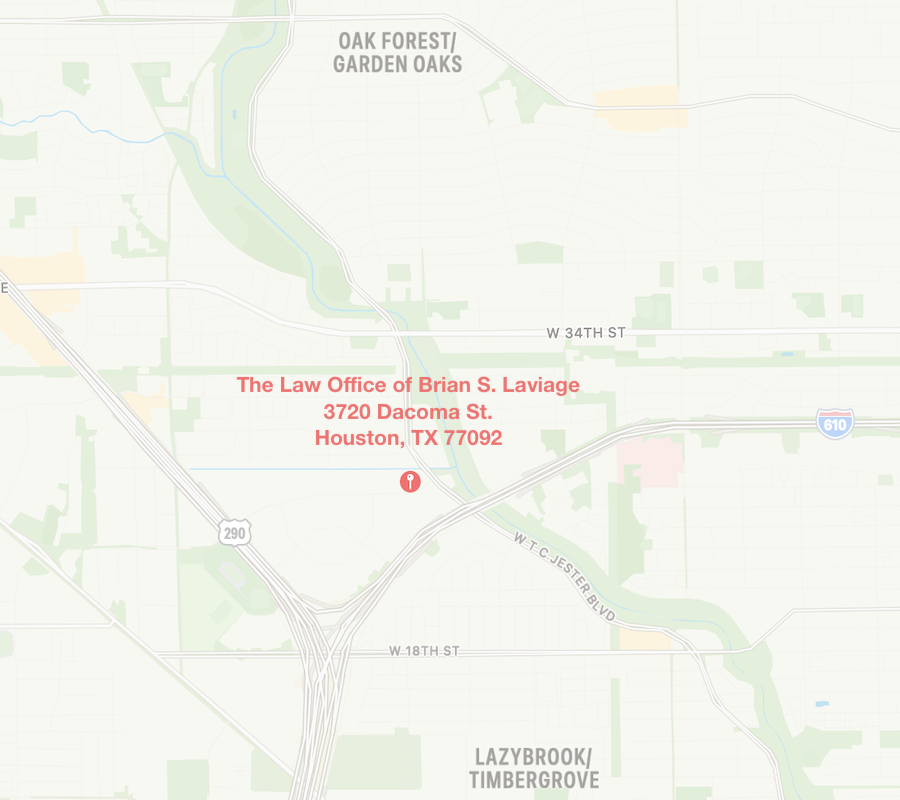Am I Eligible for DWI Sealing?
If you’ve been convicted of a DWI/DUI charge, you can call us at (832) 259-9095 to speak immediately with a DWI lawyer, or use the following DWI Sealing Eligibility Test to determine if you’re eligible for an Order of Nondisclosure of your DWI offense. Answer the questions by selecting the appropriate option for your case:
DWI Record Sealing
If you’ve been convicted of Driving While Intoxicated, you’re facing the long-term challenges created by one very bad decision – heavy fines, driver’s license suspension, insurance hikes, and employer disclosures. Just to name a few.
But here’s the good news. The State of Texas has decided to offer some first-time drunk drivers a second chance while also making Texans safer on the road. If you have a DWI criminal record in Texas and want options, call The Law Office of Brian S. Laviage at (832) 259-9095 and:
You can also complete the DWI Nondisclosure Eligibility Test above to determine if your eligible to seal your DWI record from public view.
Can a DWI Be Expunged in Texas?
No, a DWI offense cannot be expunged in Texas, but it can be sealed. DWI record expungement refers to erasing a DWI from a criminal record as if the offense never happened. This is currently not possible in the state of Texas.
DWI record sealing, otherwise known as an DWI nondisclosure, refers to hiding a DWI offense from public view. This is useful for a number of reasons, but is especially important for those wishing to advance their career opportunities.
HB 3016: Order of Nondisclosure for First-Time DWI Offenses
A brand new law, HB 3016, makes it possible for first-time offenders to have their DWI records sealed from public view – that is, if your DWI conviction did not result in injury or property damage, and you don’t have a prior criminal record. This includes first-time offenses that occurred prior to the law’s enactment in June.
A sealed record means that your conviction will not show up on a criminal background check, which is often a routine requirement in modern life, whether you’re trying to keep your current job, apply for a new one, or simply volunteer to drive kids on a school field trip.
DWI Nondisclosure Eligibility
To be eligible for DWI nondisclosure, you must meet the following minimum conditions:
- Received probation
- Completed all conditions of probation
- Have a blood alcohol level at the time of your arrest less than .15 BAC
- Used an ignition interlock device on your car for six months, OR five years has passed since completing probation
The ignition interlock device, otherwise known as a breathalyzer that controls a car’s ignition, prevents a car from starting if you’ve been drinking. This is the incentive that M.A.D.D. (Mother’s Against Drunk Driving) has gotten behind. Some of the conditions of probation might include:
- jail time
- probation
- community service
- alcohol education
- payments of any fines or fees
How would a DWI Order of Nondisclosure Help Me?
An order of nondisclosure is sometimes referred to as record sealing. It prohibits public entities such as courts and police departments from disclosing certain criminal records. It also, most importantly, makes it legal for you to NOT disclose information about your criminal history subject to an order of nondisclosure in response to questions on job applications.
For example, if you’ve been convicted of a DWI but have gone through the necessary conditions to be eligible for DWI record sealing and have successfully completed an order of nondisclosure for the offense, you can legally omit the DWI offense from any questions asking about criminal history. If you didn’t have an order of nondisclosure for the DWI, legally, you would be required to disclose the DWI offense on a job application.
There are exceptions for an order of nondisclosure. For example, certain state agencies are entitled to information subject to an order of nondisclosre.
How do I obtain an Order of Nondisclosure?
You need an attorney to petition the correct court and ensure that your records are properly sealed. If you have any questions related to first-time DWI record sealing, call The Law Office of Brian S. Laviage at (832) 259-9095 or Get Legal Help now.
What happens after my Petition for an Order of Nondisclosure for DWI is Filed?
- The clerk of the court where the petition was filed will provide notice of the filing to the State of Texas prosecutor’s office.
- The State of Texas may request a hearing on your petition and if so, the following questions may be asked:
- Are you entitled to file the petition?
- Is the issuance of an order of nondisclosure in the best interest of justice?
If the State requests a hearing before the 45th day after receiving the petition filing notice, the judge of the court must hold a hearing. You are required to attend this hearing and it’s important that your lawyer be present. In many cases, the judge will decline to hold a hearing, especially if he or she determines that you are entitled to file the petition and issuance of an order of nondisclosure will be in the best interest of justice.
In short, it’s always best to hire a lawyer. If they take on your case, it’s in their best interest to make sure they’re successful. The Law Office of Brian S. Laviage has over 10 years of experience in record expungement and nondisclosure cases and can help guide you through this delicate process.

